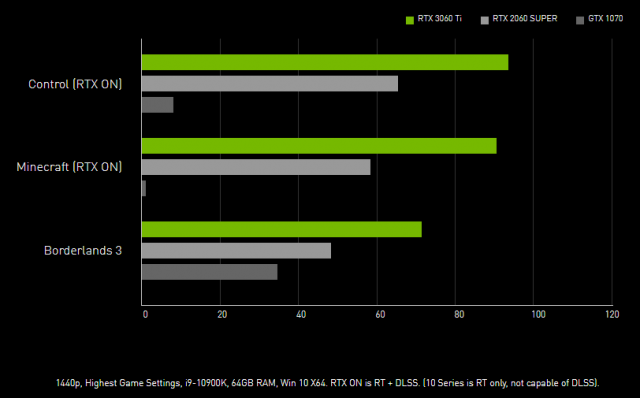Following up on the release of the RTX 3070, 3080, and 3090 earlier this year, NVIDIA today launched the RTX 3060 Ti. Priced at $400, the company claims the card is more powerful than last generation’s RTX 2080 Super which was priced at $700.

Supporting the same flagship features—like accelerated ray-tracing, DLSS 2.0, and RTX IO—as the more expensive 30-series cards, the RTX 3060 Ti is introduced as the most affordable GPU in the lineup. Here’s the basic 3060 Ti specs, price, and release date alongside the other 30-series cards:
| RTX 3090 | RTX 3080 | RTX 3070 | RTX 3060 Ti | |
| Price | $1,500 | $700 | $500 | $400 |
| Release Date | September 24th, 2020 | September 17th, 2020 | October 29th, 2020 |
December 2nd, 2020
|
| CUDA Cores | 10,496 | 8,704 | 5,888 | 4,864 |
| Boost Clock (GHz) | 1.7 | 1.71 | 1.73 | 1.67 |
| Memory | 24GB (GDDR6X) | 10GB (GDDR6X) | 8GB (GDDR6) | 8GB (GDDR6) |
| Connectors | 1x HDMI 2.1, 3x DisplayPort 1.4a | |||
Although Nvidia says the card can outpace the RTX 2080 Super, we haven’t found any detailed data released by the company on that claim just yet. However, it did put out some data on the 3060 Ti vs. RTX 2060 Super vs. GTX 1070 by comparing framerate in two ray-traced games and one game without ray-tracing.

The RTX 3060 Ti is available starting today, both from NVIDIA and other GPU vendors; you can check out a complete list of availability here.
AMD this year also revealed its latest Radeon 6000-series GPUs in October, touting an included USB-C port “for a modern VR experience.”







